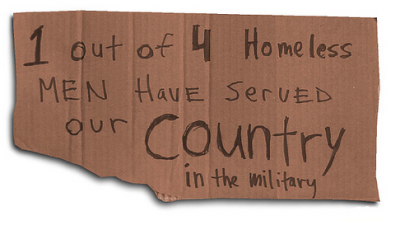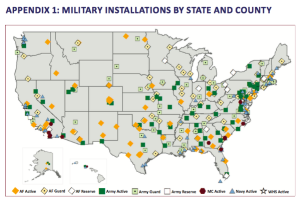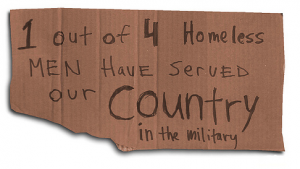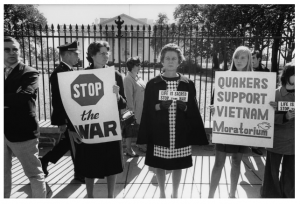10/15/2018 by Eleanor Goldfield
It’s a pretty boring drive. My friends in Sweden always engage their rose-colored paradigms when I talk about driving in the US. They think it’s like Thelma and Louise or that Johnny Depp commercial where he’s driving out in the desert at sunset, burying some jewelry in the midst of a wide expanse of red earth and rock. But, no. This is not a way-out-west badass, cool guyliner kinda drive. It’s a snoozer, tunnel-vision-maker of a drive – with too many cops and not enough Sheetz locations.
Come to think of it, I’m pretty surprised that I even noticed the sign. At the same time, I’m rather surprised I’ve never seen it before. I’ve crossed the northern and southern borders of North Carolina more than a dozen times in my life and never before noticed the border announcements of our apparent motto: “The Most Military-Friendly State in the Nation!” And here I thought we were content at being First in Flight. The most military-friendly? What does that even mean? I didn’t even know there was a contest for that. As bewildered and uncomfortable as I was upon seeing that sign, it did give me something to ponder for those last couple of hours.
All told, the estimated military spending covering the period from October 1st, 2018 through September 30th 2019 is $892 billion. That includes the $616.9 billion base budget for the Department of Defense ($19.8 billion more than the DoD originally requested), $69 billion for fighting ISIS, aka “overseas contingency operations,” as well as chunks for the Department of Veteran Affairs, The State Department, Homeland Security, National Nuclear Security Administration and FBI & Cybersecurity divisions in the DoJ. More than half of our discretionary spending goes to the military. To say that we’re a military-friendly country would be a gross understatement. We spend more on our military than the next nine countries combined. On a federal level, these numbers aren’t particularly difficult to find. You can even find the unbelievable report that between 1998 and 2015, the Pentagon spent an unaccounted for $21 trillion. You may not be able to process this information, but you can find it. Of course, our war machine doesn’t just exist on a federal level. There are military installations in every state with thousands of personnel playing with billions of dollars worth of local and state contracts. Indeed, there really isn’t a state that isn’t “military-friendly.” But seeing as it’s a contest and term I was unfamiliar with, I dug deeper.
The Department of Defense hosts a website called Military State Policy Source, a site that seeks to “identify and address the most pressing needs of service members and military families affected by state policies. The site and its easy-to-understand resources are aimed at state policymakers and their staffs.” In other words, it’s a lobbying site for military personnel and their families. It focuses on a range of key issues including medicaid waivers, pro-bono legal assistance, special legal and consumer protections, the transferring of licenses and certificates for military spouses and more. What an amazing resource! Now just for fun, imagine if the EPA had a similar site geared towards policymakers and staff that sought to highlight the interests of people and planet in order to make life easier for marginalized communities on the front lines of climate change. And then you’d even have a status tracker like the Military State Policy source does – so you can see how environmentally-friendly your state is; whether or not they’ve introduced or passed legislation on key issues. It’s hard to even conceive of such a thing, isn’t it?
(Our reporting keeps going thanks to people like you. There are no corporate ads here. Become a member in the sidebar to the right.)
Let’s try something simpler: a site geared towards policymakers and staff that seeks to make life better for every American? Well no, scratch that. That would mean that every citizen would have access to things like free college education, better job opportunities, socialized healthcare and sometimes free parking. And that’s just not something we do – because then how would we get folks to enlist?! So then it’s really no surprise that regular folks don’t have a comparable site to military.com, a platform for connection, military news and benefits education in “plain English.” In 2004, the site partnered with employment site Monster so as to offer a specialized avenue for their members. Fair warning that the site is more hawkish than General Mattis in a mosque, but if you’re only looking for information on veteran benefits, the glory-glory-hallelujah can be somewhat sidestepped. An in-depth report explains the various benefits available to veterans in each state and US territory, from parking fees to tax exemptions. Similarly, the site Military Friendly grades and awards schools and employers that are particularly friendly to military personnel and veterans – both in terms of supporting the work of the military and the well-being of veterans. So, in a nutshell military-friendly means good for veterans and good for the war machine. But this gnawed at my mind even more than that stupid sign. Because you just can’t have it both ways.
About a year ago, I met a Vietnam veteran on a bus in DC. The wet cold had descended on the city in sheets of grey ice – as if winter were not only syphoning warmth but color as well. He struck up a conversation with me. Predictably tattered and ill-fitting clothes hung off of him – if the threads were looking to him for support, they were in trouble. He had a manila envelope in his hand that he used as a prop to both start and steer the story. He had just gotten out of the hospital. Someone had found him under a bridge nearly frozen to death. During his hospital stay, a nurse showed up at his bed with the manila envelope and in a cheery voice announced that the government had been trying to get a hold of him. He had been awarded a medal for his valor in Vietnam. His latest near brush with death had afforded them the opportunity to give the veteran his medal; at last these two symbols of American exceptionalism could be united. He laughed an absolutely joyless laugh. This bus was taking him to a shelter in Virginia. He was hoping to get a bed tonight. He’d just been to some military offices trying to find someone to sell the medal to – or barter it for housing, or some food. He said he’d even offered it to the lady at Pret. No one wanted it, including him.
For the record, Virginia is considered to be one of the most military-friendly states. While veterans experience lower poverty rates than the national average, their poverty rate is steadily rising. Twenty-two veterans commit suicide a day. I couldn’t find any stats on how many freeze to death. It’s absolutely important that veterans have resources that provide information on benefits and services, that these benefits and services exist. But the fact that the sites are either operated by – or hugely supportive of – the war machine is severely problematic. Firstly and simply, it’s pretty damn twisted that the system offering baseline help for veterans is the same system that pushes to add more veterans to the ranks it can’t currently serve. Secondly, these ra-ra war sites reinforce the economic draft and normalize the idea that “perks” like healthcare are only available to the few and the proud and are therefore worth killing people for. If everyone got free college, at least 6 people that I know personally would not have enlisted.
Thirdly, it keeps veterans in a loop of military work – essentially never removing them from active duty as they so easily shuffle from battlefield to the private military business sector. And finally, the more glorified our freedom crusades are, the more veterans we create. More broken bodies, minds, and souls get spit out by a profit-based war machine, making bank off of blood while we the people pay for their havoc.
I don’t want to pay for war. I don’t want to pay to create new veterans. I want to pay to legitimately assist the veterans we already have. And beyond that – assist people in general (I know, crazy concept). Because all of the benefits listed on these sites – like tax breaks for buying a home – should be (and can be) available for the millions of poor Americans who need them, including veterans. I want my tax dollars to go to helping people, not the military. This is a really important distinction. If and when veterans access their benefits, get a good job and can buy a house, it’s not because the system cares about or sees them as people, it’s because it cares about them as soldiers. It cares about them as participants in a jingoistic violent paradigm that depends on propaganda, economic drafts, and incentives to perpetuate war for profit. For many folks, these incentives are just too tempting. The prospect of a college education when millions are too poor to even afford rent is a cruel and far too usual con. Military-friendly isn’t about veterans anymore than our wars are about freedom and democracy. Military-friendly means good for business. And thanks in no small part to local and state governments, business is booming.
This past summer, the Department of Defense’s Office of Economic Adjustment released a report titled “Defense Spending By State,” covering the 2016 fiscal year. (Note that since then, military spending has increased). Split across the 50 states and DC, the DoD spent $378.5 billion on contracts and payroll, with 68% of that going to contracts with private companies. 32% went to paying salaries. The report ranks states with regards to number of personnel, contract spending and overall military spending in each state.
Since I’m on a home kick, let’s take a look at North Carolina. Thanks to eight military bases and more than 200,000 personnel, the tar heel state ranks 4th in number of personnel and 5th in personnel spending. It ranks 25th in contract spending, with a mere $2.8 billion spent on contracts. Overall, it ranks 12th in the nation with a total of $9.5 billion spent in state. That’s a pretty damn military-friendly resume.
However, NC legislators clearly didn’t feel that it was friendly enough. In late August of this year, Booz Allen Hamilton announced that they’d be adding 208 jobs to their Fayetteville, NC workforce thanks to roughly $2 million in state and local financial incentives. The question as to why BAH needs financial incentives when it already has $52.1 million worth of NC contracts wasn’t addressed. The bulk of the $2 million incentive package will come from The Economic Development Partnership of North Carolina (EDPNC), a business recruitment organization that’s partially funded by the the NC Department of Commerce. Outside of their buxom grant packages, EDPNC has compiled a wealth of information on just how business-friendly (and in this case military-friendly) NC really is. NC has the lowest corporate tax rate – at 3% and by 2019, it’s expected to drop to 2.5%. Furthermore, EDPNC boasts about the “affordable labor costs,” pointing out that wages for aerospace workers are 25% lower in NC than they are in aerospace hubs like California and Washington.
I really feel like that border sign should read “Will Oppress Residents The Most For Blood Money.”
According to the 2017 census, the median household income between 2012-2016 in North Carolina was $48,256. That’s more than $7,000 less than the national median income for that time period. But hey, at least we’re giving military contractors incentives to bring business our way!!! And North Carolina is far from alone.
California, for instance, is number 1 in contract spending, number of personnel and overall spent in state. Back in 2014, California’s legislature voted to grant $420 million in tax incentives to Lockheed Martin, a company that in 2016 got $4.9 billion worth of federal contracts in California alone. Meanwhile, four out of the bottom five places for small businesses are in California and the state ranks second from last in homeownership. There’s only one affordable housing unit for every five extremely low-income households. A report released in May of this year shows that “the shortage of affordable and accessible housing is restricting growth, inflicting economic and environmental damage, and causing many low-income and middle-class residents to seek opportunities elsewhere.” People are leaving California in droves.
Unfortunately, prospects aren’t bright anywhere. Indeed, wherever you’re reading this, your state also has a housing crisis – because the whole country does. And yet there are six empty houses for every one homeless person. As the saying goes, “there’s enough for everyone’s need but not everyone’s greed.” State economies are buckling under the costs of playing sugar daddy to big corporations like Lockheed Martin, Booz Allen Hamilton and many more. Which is to say, you and I are buckling under the economic stress of bolstering a bloated military industrial complex on a local and state level. And that feels really damn bleak. It is also, however, an opportunity.
The concept of going up against the military industrial complex on a federal level is exhausting. That’s not to say that we shouldn’t address the federal war machine. But we need to be realistic. As is the case with many environmental issues, we can more directly and successfully make an impact on a local level. And just like the oil and gas industries, the military depends on local recruits, on local and state contracts, on local and state incentives. These are our local and state legislatures passing off these tax incentive bundles. These are our local communities taking a hit so that the war machine can bore into our body politic like a diseased tick. We can start by addressing the false claim that the military is good for the local economy. That $2 million in North Carolina couldn’t have gone to protect communities against the inevitable effects of climate change? It couldn’t have gone to schools rotting and pumping lead-poisoned water into predominantly black students? That $420 million in California couldn’t have gone to incentivize small businesses in California, or make it easier for folks to stay in or get into homes? Of course it could. But because of our military-friendly paradigm, war comes first – and second, and third.
The military doesn’t create opportunities, it destroys them. Private sector military jobs (the majority of military jobs) funnel billions into the pockets of over-stuffed CEOs. Public sector military jobs pull public funding from the public in order to bolster an obese war machine that perpetuates nothing but terror and oppression at home and worldwide. Still, there are thousands who work for the military industrial complex – and I have no interest in seeing them destitute. Just like with the fossil fuel industry, we need a just transition from a war economy to a peace economy. Folks working at these jobs could easily be doing anything else – technology to promote surviving rather than dying, research into ways to help people rather than kill them. By focusing our ire on the local tentacles of the military industrial complex, we set ourselves up against a realistic adversary – one that has specific pressure points that we can see and feel in our communities. The Defense Spending by State report is a great place to start. The top companies listed in your state are likely also the ones getting kickbacks. Code Pink’s Divest From The War Machine initiative is another good resource for both education and activation. Indeed, even the military-friendly sites can give you an idea of what companies and schools are pedestaling the war machine paradigm. I can’t say whether North Carolina deserves the title of most military-friendly state in the nation. But I do know that that shouldn’t be a point of pride.
—
A weathered sign outside of Alexandria, VA reads “The Purple Heart State.” I remember the old veteran I met on the bus. I remember the tattered “For Rent” sign under a Marine recruitment billboard on my way out of Charlotte, NC. I remember the sick feeling of a brainwashed pride, and a pride in brainwashing, when politicians snapped that “we don’t have money for that!” Yet they always had money for war. The road slows as I near DC, the seat of empire. It always feels heavy coming back. The weight of all the ills settle onto my mind like Sisyphus adjusting his grip at the bottom of the hill. But this time, it doesn’t feel as hopeless. That Sisyphean boulder – the US empire – is made up of so many smaller stones – each one manageable on its own. It’s damn hard to push a boulder – but I can throw a stone. And as they say in Palestine, “I’m a stone thrower. Are you?”
(Our reporting keeps going thanks to people like you. There are no corporate ads here. Become a member in the sidebar to the right.)








